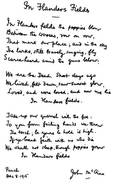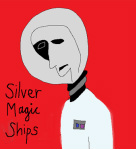
make claims related to the personal lives of historical figures"
So said Mike Steinhauer, director of Bytown Museum in Ottawa in a press release reported in:
Seto, Chris (2011) "Sexual preference of John McCrae questioned by museum", Guelph Mercury, 27/07, accessed 02/08/2011 at, http://www.guelphmercury.com/news/local/article/569563--sexual-preference-of-john-mccrae-questioned-by-museum
Steinhauer's statement will no doubt send shockwaves among the curatorial community: what else are we supposed to do, then?
The director's stern directive was in response to a controversy involving the Canadian soldier-poet, Lt.-Col. John McCrae (1872-1918). Steinhauer's colleague, Francesco Corsaro (the museum's "director of development") suggested to Pink Triangle Press that McCrae was a homosexual and that his most famous poem In Flanders Fields (1915) was written in memory of his "lover", Lt. Alexis Helmer.
The poet and his poem are mentioned in Bytown Museum's exhibition, "Hidden Treasures", although it would appear that the question of McCrae's sexuality is not actually discussed in the museum. And its director was quick to point out that Francesco Corsaro "neither planned nor conducted research for the exhibition". Steinhauer and others further undermined Corsaro by saying that his claims lacked any supporting historical evidence.
This raises many questions. Can (or should) museums speculate? Is Mike Steinhauer correct to say that museums shouldn't "make claims related to the personal lives of historical figures"? How much control should museum management exert over what their colleagues say to the media? And, thinking a trifle more cynically: is a little scandal like this such a bad thing? Isn't it an excellent way for a museum to promote itself? (Would I have even heard of Bytown Museum if it wasn't for Francesco Corsaro?) Or does it undermine public confidence in the museum as a bastion of impartial knowledge where personal claims and speculation are rejected in favour of cool, hard facts expressed by impartial "experts"?
Whatever one's point of view, perhaps the most significant consequence of this story is that it prompts us to revisit McCrae's sublime poem:
In Flanders Fields
In Flanders fields the poppies blow
Between the crosses, row on row,
That mark our place; and in the sky
The larks, still bravely singing, fly
Scarce heard amid the guns below.
We are the Dead. Short days ago
We lived, felt dawn, saw sunset glow,
Loved and were loved, and now we lie,
In Flanders fields.
Take up our quarrel with the foe:
To you from failing hands we throw
The torch; be yours to hold it high.
If ye break faith with us who die
We shall not sleep, though poppies grow
In Flanders fields.






